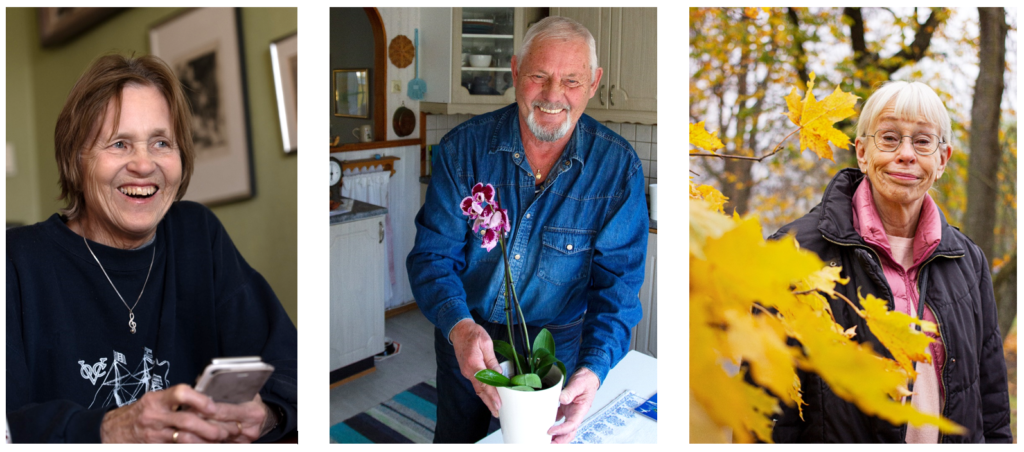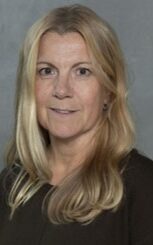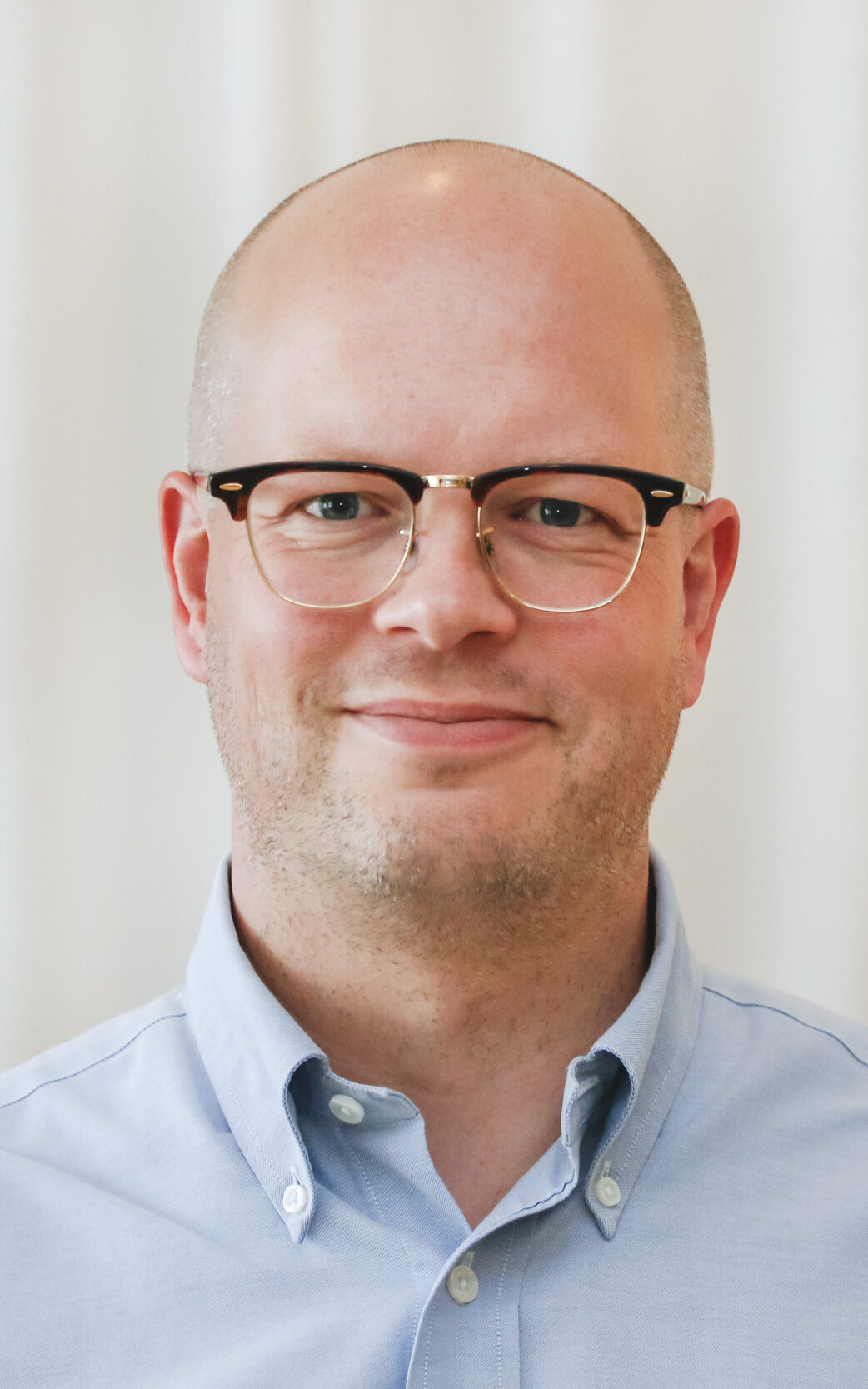During 2021-2022 we carried out the sixth round of the The Swedish Panel Study of Living Conditions of the Oldest Old with the help of the interview company IPSOS in Härnösand. On this page, you as a participant, your family, and your carers can read about the purpose of the study, how the results will be used, and why you specifically have been chosen to participate.

Photographers: Ian Gadelius, Linn Fryk, Sara Eng

What is SWEOLD?
SWEOLD is an ongoing, nationally representative survey of the older population of Sweden. It is used to study the living conditions of older adults in Sweden and shine a light on issues facing this demographic. The interview covers things that are important in life such as health, activities, social life, economy and healthcare.
Why should you participate?
The older population constitutes a significant group in society. It is a heterogeneous group of individuals, with varying living conditions and life stories. To get a fair picture of what the living conditions look like and how they vary over time, we need to interview people in this age group. Without interviews with different people, we cannot reach an accurate understanding of people’s living conditions and health, and how they change.
The information gathered in this study is an important factual basis for us to use in our understanding of society and how it changes. The more participants we get the better, and the more representative knowledge we will gain! The results from this study are used as a foundation for discussions about the way in which society is developing, and to inform politicians and other decision-makers. Our results are disseminated in media, used by pensioners’ organizations and government agencies, as well as by politicians on governmental, regional and municipal levels.
By taking part in the survey you will be involved in writing history. The picture of the Swedish population which is formed through this study will be important for future generations. Your participation in this study is invaluable!
Why is the study repeated?
Our living conditions are constantly changing. The composition of older people as a group also changes over time. Older birth cohorts pass away while younger birth cohorts, who lived their lives under different conditions, reach older age. To answer questions about living conditions for older people as a group, new surveys must be conducted regularly. By following people over time, we can also study how earlier living conditions affect people later life.
Are earlier living conditions related to current health, social relationships and/or physical and cognitive abilities? Questions like this can be answered through repeated study of the same people. We also make sure to draw extra samples for each survey so that it is always representative of Sweden’s population.
The Coronavirus Pandemic
The Coronavirus pandemic affected our lives for several years, and for older people it may have had the biggest impact. In the latest survey we wanted to find out, among other things, how everyday life had changed for people over age 75.
In addition to the questions we ask at each survey, we also asked questions about how different lifestyle habits were affected by the pandemic. We did not carry out in-person interviews, the survey was instead conducted over the phone.

Sample Selection
To accurately portray the living conditions of the older population in Sweden without contacting every individual over a certain age, a sample has been chosen to represent the population. This sample is like Sweden in a miniature format, each individual in the study represents a specific number of people in Sweden. Everyone who has been asked to participate in the study has been chosen based on certain criteria – and this is why you are so important and cannot be replaced. All answers are equally important, whether you are healthy or not, active or more sedentary, live alone or with others, or live in the city or on the countryside – your participation matters.
How does the interview work?
The interviews in the most recent data collection were carried out per telephone by experienced interviewers from the survey-company IPSOS in Härnösand. These interviewers follow important ethical guidelines and employ strict confidentiality. These interviewers can give you more information about the study.
The questions you will be asked have to do with areas of your life like health, activities, your social life, economy and what your everyday life looks like. You are of course free to ask to be exempt from any question you might not want to answer.
Why were you selected to participate?
There are two reasons you have been selected – you have either participated in a study before, the Swedish Level of Living Survey or SWEOLD, or you are part of one of our supplementary samples. In 2021 we had three additional samples; one national sample to ensure the survey continues to be nationally representative, one for Dalarna and one for Stockholm.
No matter the reason you were chosen, it means a lot to us that you participate. Your answers to the survey questions will form important puzzle pieces in the picture of older people’s living conditions in Sweden. Without your participation it will be harder for us to get a complete picture of what life is like when you age, how older adults live today, and what the future for an aging population might look like.
If you cannot participate
It is important that all voices in society are heard. If someone who we want to interview has auditory impairments, dementia or might be unable to participate in the interview for other reasons, we will together with the interviewee organise for a relative or a carer to complete an indirect interview, meaning that we will interview someone close to this individual who can answer the interview questions in their place.
What are the results used for?
The Swedish Panel Study of Living Conditions of the Oldest Old – SWEOLD has been carried out in 1992, 2002, 2004, 2010/2011, 2014 and 2021/2022. The results from these interviews have been used in various ways – from publications in scientific journals to influencing decisions at parliamentary level. To read more about findings go to the publications tab on this website.
Among other things, we have shown that the ability to perform everyday tasks has improved since the early 1990s, and this despite increasing health problems in this age group.
However, our results show significant differences between different educational groups. Those with higher education generally have better health than those with lower education and these differences have not changed over time.
Based on the SWEOLD survey, we can also state that many older people spend time with family and friends and that they to a greater extent participate in leisure-related activities than in the early 1990s.
Contact
The main people involved with this study work at Aging Research Center, a research institute connected to Karolinska Institutet and Stockholm University. The project is led by senior fellow and associate professor Carin Lennartsson together with associate professor Stefan Fors. Research coordinators Josephine Heap and Robin Ramos Serrano are also tied to the SWEOLD project.
If you have any questions or concerns please don’t hesitate to contact us at info@sweold.se or 08-524 858 15.

Carin
Lennartsson
Project Lead,
KI
08-524 858 15

Stefan Fors
Assistant Project Lead,
KI